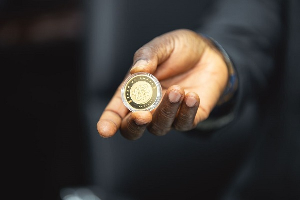The Bank of Ghana’s (BoG) gold coin investment initiative announced on 27th September, 2024 by the Monetary Policy Committee (MPC) introduces an intriguing opportunity for investors, but it also comes with unknown or less-clear elements that potential investors should fully understand before committing.
Undoubtedly, While the initiative has generated excitement, many investors may still be unaware of certain critical aspects of this investment product. Understanding the unknowns is vital to making informed decisions.
This article therefore, seeks to unmask some of these less obvious facets of the BoG’s gold coin investment.
What is the problem?
Gold coins offer an attractive investment option in uncertain economic climates such as the Ghanaian business environment.
However, beyond the surface appeal, there are key areas that remain underexplored or inadequately discussed that investors need to have clarity from an issuer (BoG) in the following areas (what you need to know):
Market Value and Pricing Transparency:
Unknown: How is the price of the gold coin going to be set, and how often will it be updated? Is the price going to be tied directly to global gold prices, or does it going to consider additional premiums?
Needs to be known: Investors should understand whether the coin’s value is based on the international gold market or has a fixed pricing system set by the BoG. Knowing how often the value adjusts to market conditions is critical for evaluating investment potential.
Liquidity and Buyback Guarantee:
Unknown: Can investors easily liquidate or resell their gold coins? Is there a buyback program from the BoG or other guaranteed buyers?
Needs to be known: Investors should seek clarity on liquidity options—whether they can resell the coins to the BoG or other authorized dealers, and at what terms. Understanding the ease of converting the investment back to cash is important for assessing risk.
Tax Implications:
Unknown: What are the tax obligations for gold coin investors in Ghana? Are there capital gains taxes, VAT, or other duties associated with buying or selling the coins?
Needs to be known: Investors need a clear understanding of any tax liabilities, both on the purchase of the gold coins and on any gains from reselling them, to fully appreciate the investment’s costs.
Storage and Security:
Unknown: How are the gold coins going to be stored? and who is responsible for their security? Does the BoG offer custodial services, or storage is left to the investor?
Needs to be known: The cost and responsibility of storing physical gold can be significant. Whether investors will have secure and insured options for storage, or if they must arrange it independently, is vital for assessing the overall risk.
Regulatory Oversight and Investor Protections:
Unknown: What regulatory protections exist for investors? Is the gold coin initiative regulated under Ghana’s securities laws, and what recourse do investors have in the event of disputes?
Needs to be known: Investors should be aware of how this initiative fits into Ghana’s legal framework and what safeguards are in place to protect their interests. Understanding regulatory oversight can help mitigate legal risks.
Currency Risk:
Unknown: How does the Ghanaian cedi’s exchange rate affect the value of the gold coin for local and international investors? Will there be price fluctuations due to changes in the currency value?
Needs to be known: For local investors, especially, understanding how currency depreciation or appreciation impacts the gold coin’s purchasing power or resale value is critical for evaluating investment returns.
Duration and Maturity:
Unknown: Is there a maturity period attached to the investment, or is it a purely speculative asset with no time horizon?
Needs to be known: If there are long-term investment expectations or restrictions on when investors can sell, this will influence their ability to make short-term or long-term plans around the coin.
Demand and Market Size:
Unknown: How much market demand exists for these coins, and who are the potential buyers (beyond the BoG)?
Needs to be known: The potential for price appreciation relies on demand. Investors should know whether these coins will primarily appeal to local investors, institutional players, or have international appeal.
Purpose of the Initiative:
Unknown: Is the primary objective of this initiative to create a store of value, boost national gold reserves, or offer a speculative investment opportunity?
Needs to be known: Understanding the underlying motivation behind the initiative (whether it’s purely investment-focused or part of a broader economic policy) can help investors assess the long-term sustainability of the program.
Associated Fees and Costs:
Unknown: What are the hidden costs or fees associated with buying, holding, and selling the gold coins (e.g., commissions, storage fees, or transactional costs)?
Needs to be known: Investors should be aware of any additional costs that might reduce their overall returns, such as broker fees or custody charges.
Impact of Geopolitical and Economic Conditions:
Unknown: How could changes in global gold markets, Ghana’s economic stability, or geopolitical factors affect the value of the coin investment?
Needs to be known: The broader economic and political environment can significantly impact gold prices. Investors should understand the risks linked to fluctuations in international gold prices or Ghana’s economic outlook.
Conclusion
Many first-time investors may be unfamiliar with the intricacies of gold markets, and a clear communication strategy will help them make better-informed decisions.
By seeking clarity on these unknown elements, investors can make more informed decisions about whether the Bank of Ghana’s gold coin investment aligns with their financial goals and risk appetite.
Business News of Wednesday, 23 October 2024
Source: Enoch Akuffu-Djobi, Contributor

















